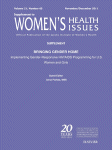Women’s Health Issues Supplement Showcases Gender-Responsive National HIV/AIDS Programming for U.S. Women and Girls
Women’s Health Issues Supplement Showcases Gender-Responsive National HIV/AIDS Programming for U.S. Women and Girls
A just-released special supplement to the journal Women’s Health Issues provides in-depth information about gender-specific health considerations of U.S. women and girls in the HIV/AIDS epidemic and recommendations for national strategic programmatic improvements to meet their needs.

The supplement grew out of a June 2010 forum, Bringing Gender Home: Implementing Gender-Responsive HIV/AIDS Programming for U.S. Women and Girls, hosted by the U.S. Department of Health and Human Services Office on Women’s Health in partnership with UNAIDS. In anticipation of the National HIV/AIDS Strategy (NHAS) release, participants recommended strategies and ideas to make HIV/AIDS prevention and care programs more responsive to the needs of women and girls. The Gender Forum recommendations were aligned with the NHAS goals of reducing new HIV infections, increasing access to care and improving health outcomes for people living with HIV, and reducing HIV-related health disparities.
Since the release of the Gender Forum Recommendations, the Office on Women’s Health, together with invited experts from the field and Federal colleagues, wrote a set of articles for a special supplement of Women’s Health Issues, a peer-reviewed, bimonthly, multidisciplinary journal that publishes research and review manuscripts related to women’s health care and policy. The articles reflect the main themes discussed at the Gender Forum, including: prevention and risk reduction, care and treatment, violence prevention, reproductive and sexual health, human rights, criminal justice issues and population-specific perspectives.
For the supplement, I co-authored a commentary with Dr. Ronald Valdiserri, Deputy Assistant Secretary for Health, Infectious Diseases, titled “Achieving the Goals of the National HIV/AIDS Strategy: Keeping Gender in Mind .” It addresses how we can aim to meet each of the NHAS goals with gender-responsive approaches. In another commentary co-authored with the Gender Forum under the leadership of Mary Bowers, Public Health Advisor with OWH, the “Bringing it Back Home: Making Gender Central in the Domestic U.S. AIDS Response ,” offers an overview of the forum and suggests efforts to advance the discussion of gender and HIV/AIDS in the U.S.
The Supplement also features commentaries by leaders in the Office of the Assistant Secretary for Health, the Office of AIDS Research and the Office of Research on Women’s Health of the National Institutes of Health, and the Division of HIV/AIDS Prevention of the Centers for Disease Control and Prevention and also includes nine peer-reviewed invited articles addressing the unique and diverse needs of women and girls with, or at risk for, HIV infection.
By Vera Yakovchenko
Public Health Advisor, Office of HIV/AIDS Policy
U.S. Department of Health and Human Services
Read more about the Supplement in this press release http://www.jiwh.org
Free online access to the commentaries and articles is available at:http://www.whijournal.com/supplements
###
About Office of HIV/AIDS Policy
U.S. Department of Health and Human Services
The Office of HIV/AIDS Policy, within the Office of the Assistant Secretary for Health (ASH), advises the Assistant Secretary for Health and senior U.S. Department of Health and Human Services (HHS) officials on: the appropriate and timely implementation and development of HIV/AIDS policy; the establishment of priorities; and the implementation of HIV/AIDS programs, activities, and initiatives across other HHS health agencies.
Reaching these goals will require that all of us—including our families, friends, schools, faith-based organizations, care providers and communities—take on the responsibility of fighting HIV/AIDS. In particular, our attitudes—about those most at-risk for HIV and those living with HIV—must be free of negative perceptions and stigma.
OHAP develops and supports initiatives to promote HHS policies, programs, and resources, including:
- Implementation of the National HIV/AIDS Strategy—working to achieve a more coordinated national response to the HIV epidemic by reducing HIV transmission, increasing access to HIV care and improving health outcomes, and reducing HIV-related disparities and health inequities.
- Secretary’s Minority AIDS Initiative Fund (SMAIF)—targeting resources appropriated by Congress to support HIV prevention, care and treatment, outreach and education, capacity building, and technical assistance activities for racial and ethnic minorities in the United States who are at high-risk for, or living with, HIV/AIDS.
- AIDS.gov—works to increase HIV testing and enhance care among people most at-risk for, or living with, HIV, by using emerging communication strategies to provide access to information on various aspects of HIV/AIDS prevention, treatment and care, including the National HIV/AIDS Strategy.
- Implementation of the Action Plan for the Prevention, Care and Treatment of Viral Hepatitis—supporting the ongoing implementation of the action plan by identifying opportunities for enhanced interagency collaboration, leveraging existing resources, and strengthening partnerships inside and outside of government.
- Presidential Advisory Council on HIV/AIDS (PACHA)—provides advice, information, and recommendations to the Secretary and to the President regarding programs, policies, and research priorities intended to promote effective prevention, care, and treatment of HIV disease.
###
* The above story is adapted from materials provided by USA Department of Health and Human Services (HHS)
** More information at USA Department of Health and Human Services (HHS)



















